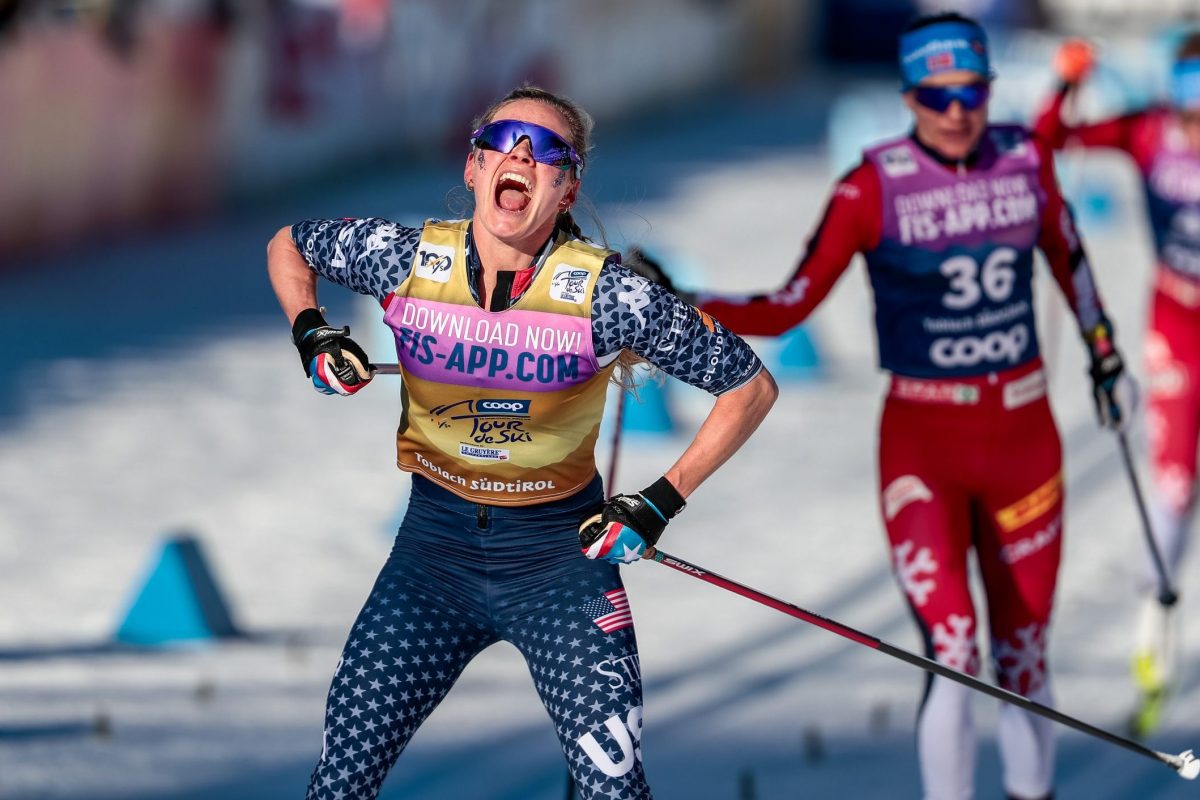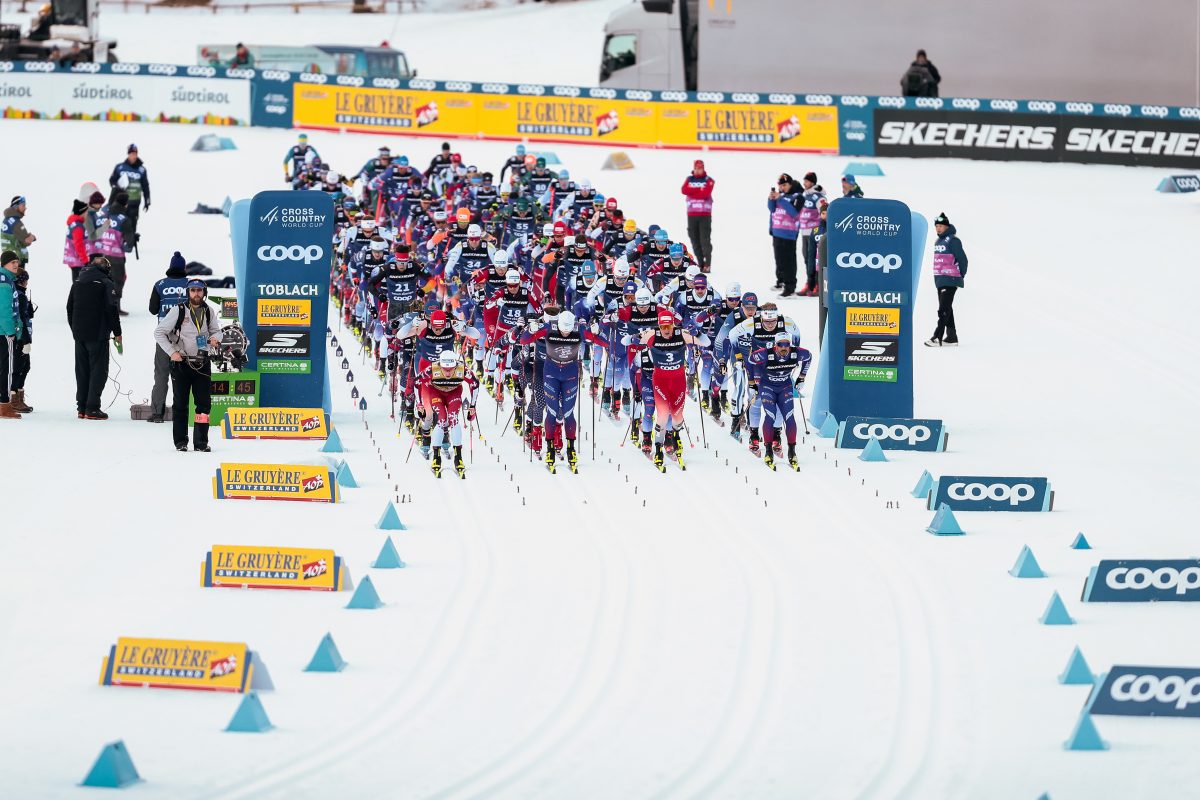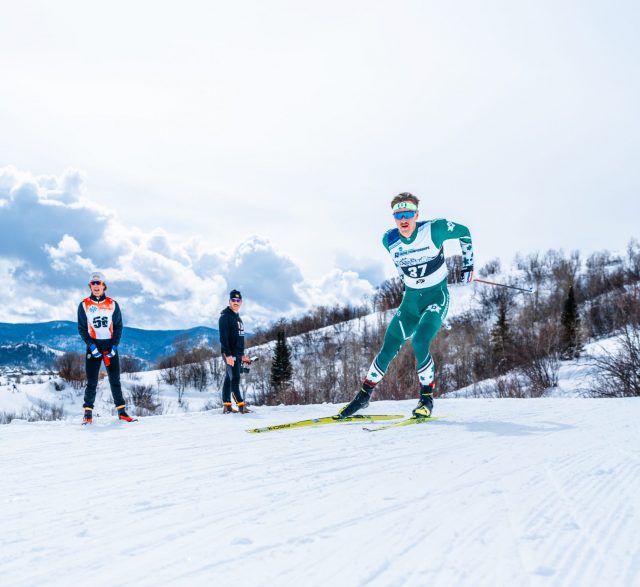
When the sun shines happily and snowstorms spread a fresh coat of white on trails and trees, it’s pretty hard to beat Steamboat’s Howelsen Hill as a ski race venue. That’s exactly what greeted the country’s best collegiate skiers for Day 1 of nordic competition at the 2024 NCAA Ski Championships as racers lined up for a 7.5 k individual start skate race.
Pitch-perfect Colorado spring conditions softened the corners—literally and figuratively—on an otherwise stark, challenging, three lap, 2.5 k course that climbed out of the Howelsen Hill rodeo grounds, turned corners, kept on going, and finally relented for a fast downhill to the finish. Located way up at 7,000 feet of elevation, the course—and the challenges of the mid-distance race distance—combined to present a true test for collegiate skiing’s young, versatile talent. The climbs would task the aerobic capacities, but the ability to recruit fast twitch fibers was one that would play a role in determining who could cover the 7.5 k the fastest. It was a utility-players race, and would make for an interesting spectacle for the spectators.
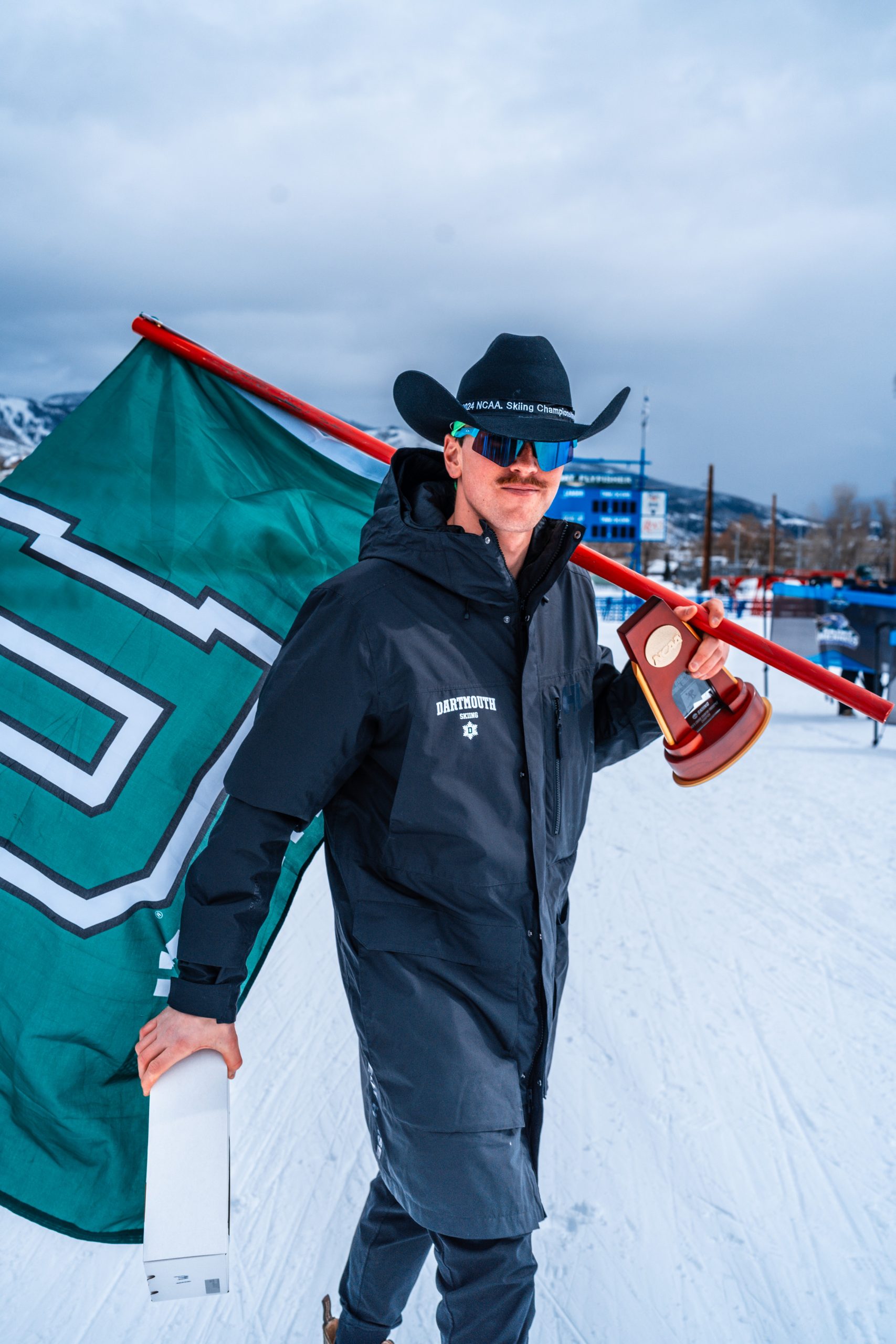
Men’s 7.5 k Skate Individual Start
At last year’s NCAA Championships in Lake Placid, Dartmouth’s John Steel Hagenbuch finished second in the 10 k skate behind then-University of Alaska-Fairbanks (now-University of Utah) skier Joe Davies. Hagenbuch came into Steamboat knowing he just needed to take one more step. The metaphor became something more literal when Thursday’s startlist was posted; Hagenbuch started one bib behind Davies, bibs 37 and 36, respectively.
Through three 2.5 k laps, Davies and Hagenbuch would remain tied to each other. Davies went through the first 2.5 k checkpoint in first place, splitting less than a second with a group of early start leaders Florian Knopf (University of Denver), and Will Koch (University of Colorado). One start place behind though, Hagenbuch was able to emerge from that pack. He came through the 2.5 k checkpoint seven seconds ahead of the leading group containing Davies and another pre-race favorite, the University of Denver’s Andreas Kirkeng. Hagenbuch’s lead was one of the only distinguishable features from the first lap of racing. The second place through eleventh place skiers were all within ten seconds through one lap, which only served to impart that the 7.5 k race would make for a race in which seconds split would be places gained or lost.
Through the second lap, some clarity began to emerge. The lead times had started to splay, with Knopf and Koch continuing to top the early starters through the five kilometer mark. Davies would again set the high bar at the checkpoint, taking nine seconds on Knopf to go into the lead, momentarily. Again though, Hagenbuch followed in short order. His time check showed that he had kept his lead steady over Davies at around eight seconds. Behind Hagenbuch, the last starter in the field, UU’s Tom Mancini had started to pick up time, as well. He moved from eighth place at 2.5 k into the fifth spot, 22 seconds off Hagenbuch.
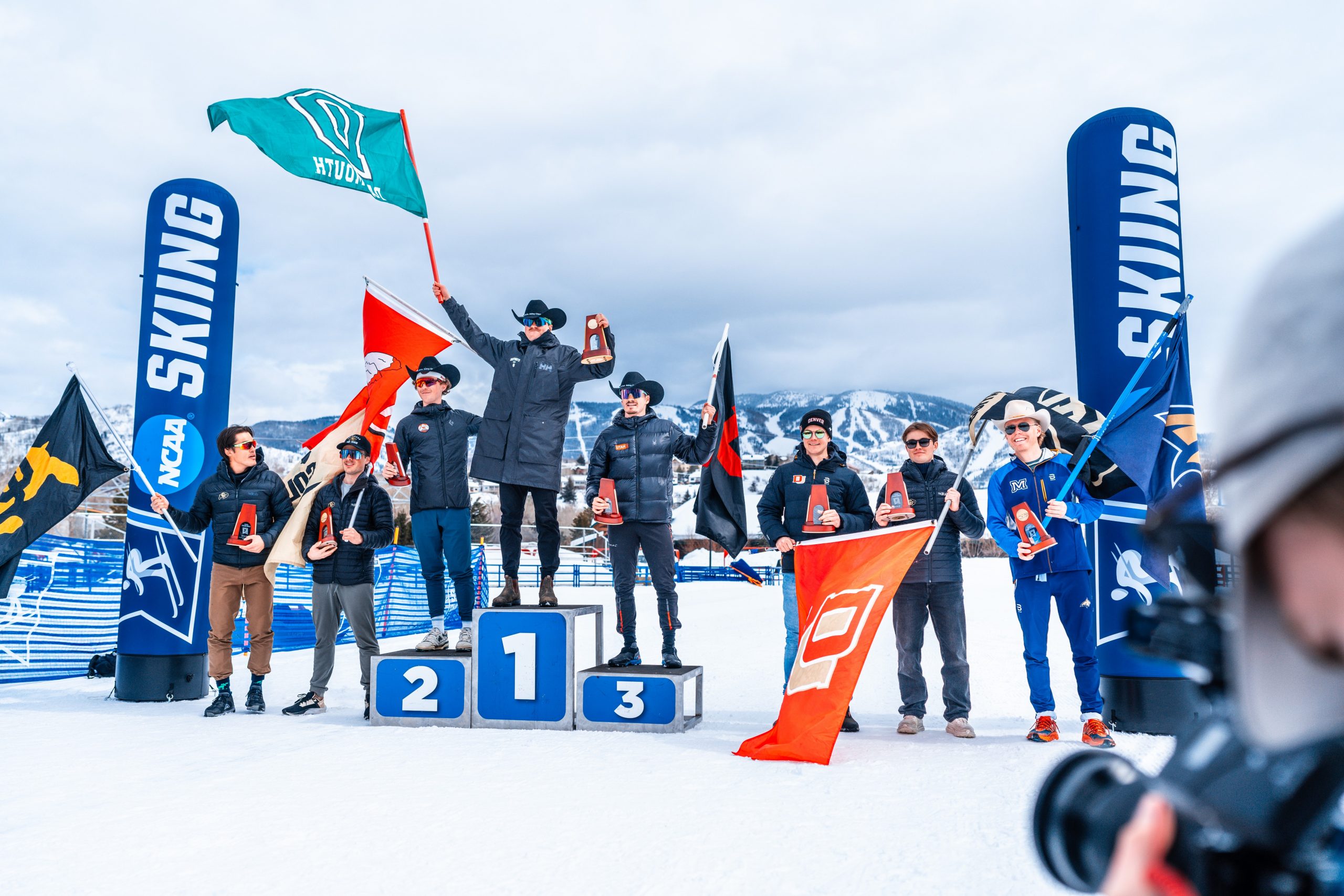
Hagenbuch’s season has been defined by milestones on a national, and international scale. When he has made moves towards a first National Championship, or a World U23 Championship podium, it has come cleanly, and decisively, in the final moments of a race. So, with a lead at five kilometers, the look ahead to the finish raised questions more in line with “Will he be able to put more time on the field?” than “Will he win?” Davies would fall into a similar category, crossing the line in first place, with a twenty second gap over Koch who would finish fourth on the day. As Davies crossed the line, Hagenbuch was coming off the downhill leading to the Steamboat Springs stadium, and would answer the questions raised at the 5 k checkpoint with an affirmative, “Yes!” He gained a couple more seconds over Davies and the field, to total eleven, en route to winning the race. UU’s Mancini, meanwhile, surged, to move ahead of Koch and finish third place, giving UU a dual podium in second and third place.
For Hagenbuch, the win will round out a milestone-filled season with a particularly meaningful one. After three years on the college circuit, Hagenbuch (a junior) is now an NCAA Champion, and has opened up the door to complete a rare NCAA sweep for an American male skier (the last skier to do so was Ben Ogden for the University of Vermont in 2022). “He’s been skiing at a really high level all winter,” said Dartmouth Men’s Head Cross Country Coach, Brayton Osgood, of Hagenbuch’s race. “And he’s done a tremendous job all season of balancing international competition, EISA Carnival racing, and his academic commitments. He skied confidently and strong today, I’m so impressed with his approach and racing today.” Osgood added that Hagenbuch’s race helped set a tone for the entirety of the Big Green on Thursday: “As a full team, this was the best day we’ve had at NCAA Championships in my time at Dartmouth – all six of our skiers in the top-20, three All-Americans, and two podiums including a National Champion. We are really proud of this team.”
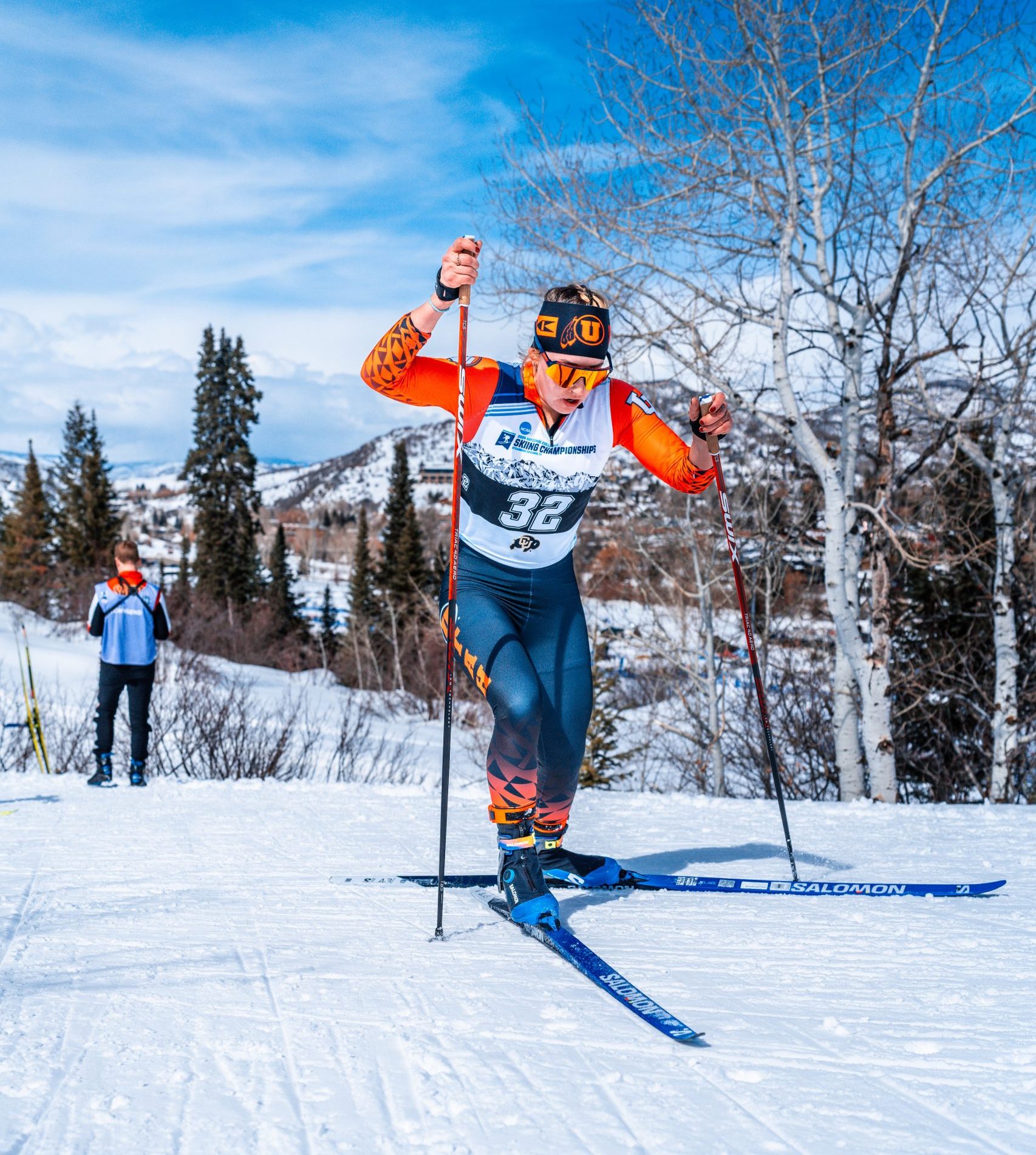
Women’s 7.5 k Skate Individual Start
The University of Utah (UU) Women’s team is in the middle of a streak—three straight years of NCAA individual championships. That streak has been made possible by a trio of skiers, Sophia Laukli, Novie McCabe, and Sydney Palmer-Leger. The youngest of the trio, Palmer-Leger had started the impressive run for the UU team by sweeping NCAA Championships as a Freshman in 2021 at Jackson, New Hampshire. Since those victories, she has worked steadily, skied with consistency, and been a factor in nearly every race she has started. She hadn’t, however, skied back to the top step of the NCAA podium.
Fast-forward to 2024, when factors in Steamboat Springs hinted at Palmer-Leger having a good chance to cap her collegiate career with another NCAA title. The Utah native knows how to ski well at altitude, and 7.5 kilometer distance seemed to provide a mid-distance sweet spot. Through the first checkpoint, she was in first place, with a gap of six seconds over early starting pace-setter Astrid Stav (UAA). Palmer-Leger, though, started with bib 32, at the front-end of the field’s main “A-seed” contenders. Bib 35, Montana State’s Tilda Baangman, came through the first checkpoint with a lead of eight seconds on Palmer-Leger, and Haley Brewster (UVM), World U23 silver medalist in the 20 k skate, started with Bib 40, the last skier on course. When Brewster came through the 2.5 k mark two seconds behind Palmer-Leger, it seemed to create a separation of three skiers as the top contenders. Palmer-Leger was there; as a consequence, UU was again, too.
Through the second lap, Palmer-Leger again set the bar for the race’s top-seeded skiers, further distancing herself from early-starting Stav, who was now 20 seconds behind the UU skier. Baangman would be the next main contender through the checkpoint, but when she reached the stadium on her second lap it was with a split behind Palmer-Leger. Baangman had lost an eight second advantage and now stood nine seconds down from Palme-Leger in second place. Haley Brewster would follow five seconds off of Baangman in third place, which solidified the standing of Palmer-Leger ahead of the rest of the pack. Baangman and Brewster’s splits, too, drew attention further down the pack, where a number of skiers had been able to push the Howelsen hills to surge towards the front of the pack. The most noticeable among these was Dartmouth skier, Jasmine Drolet, who pushed from a 13th place split at 2.5 k to sixth place at the 5 k.
When Palmer-Leger reached the finish-line, she was well above the field. She had stuck to her race plan, according to UU Head Coach Miles Havlick, “Her race plan was to go out hard and try to hold it which is exactly what she did.” The gap over a surging Rosie Fordham (UAF) stood at forty-three seconds. Baangman finished twenty-four seconds behind Palmer-Leger, with Drolet following close behind. The Dartmouth skier had started with bib 38 to Baangman’s 35, which spelled out that she had continued her middle-race surge to put in a phenomenal final lap. Drolet finished two seconds ahead of Baangman to take second place, and with just two starters behind her on course, nearly guaranteed herself a podium finish. The only factor behind her was a big one, however, as Brewster looked to push for the finish-line wearing bib 40. Brewster crossed the line with a one second advantage over Drolet—21 seconds behind Palmer-Leger—to take second place.
The podium then was determined: Palmer-Leger (UU) first, Haley Brewster (UVM) second, Jasmine Drolet (HAR) third.
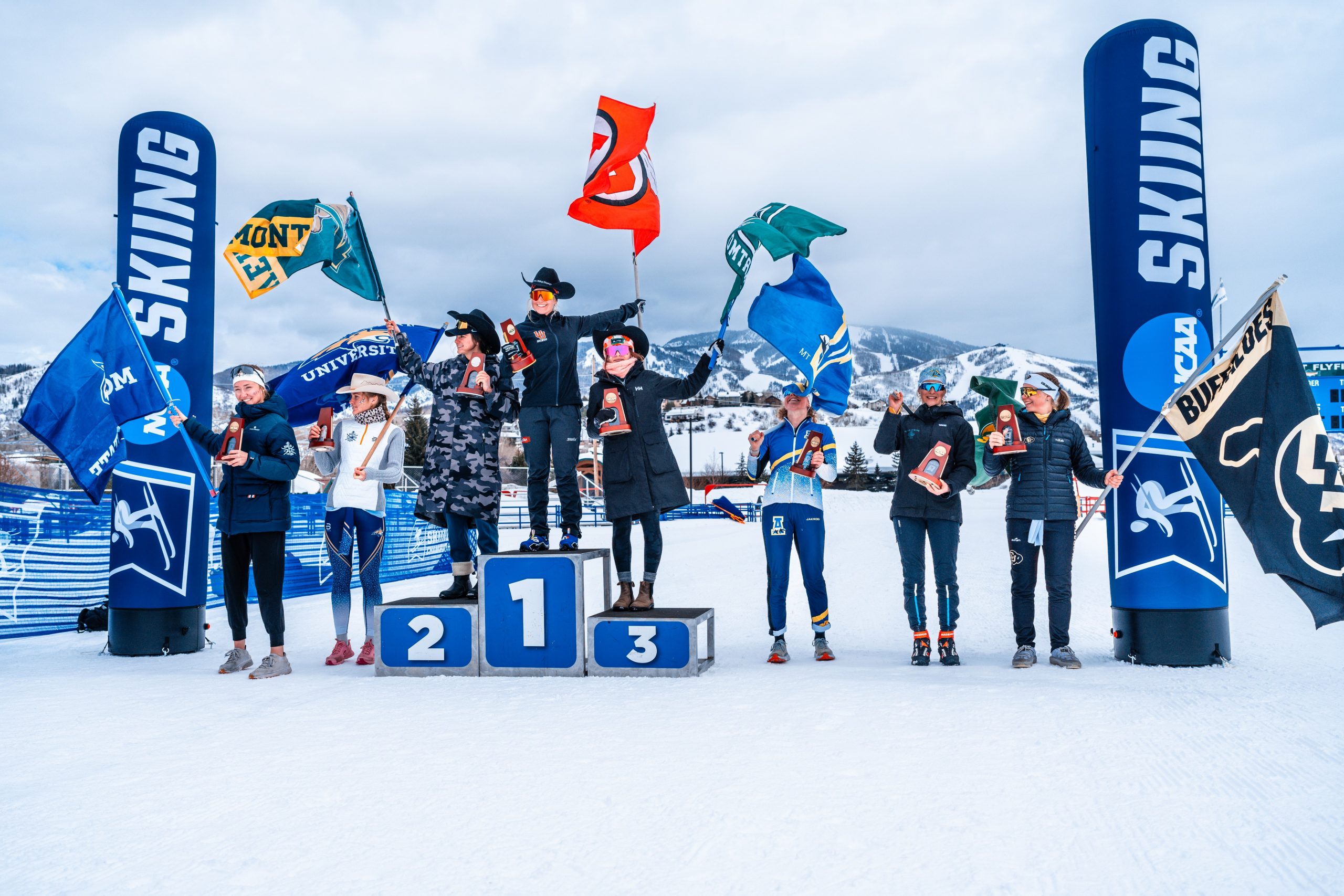
Three years on from Jackson, New Hampshire, Palmer-Leger is an NCAA Champion again, and opens up her own historic possibility going into Saturday’s race. University of Utah Head Coach Miles Havlick said post-race on Palmer-Leger’s day: “Sidney skied an incredible race today. Her race plan was to go out hard and try to hold it which is exactly what she did. There were several of her competitors who blew up or started too conservatively, and I think she executed perfectly.” With three NCAA wins already behind her, Palmer-Leger has an opportunity to join a list of just three women skiers to have four NCAA Championships with Saturday’s race. She already has matched the total from her former teammate, McCabe, who swept NCAAs last year, making Palmer-Leger among the most accomplished NCAA skiers ever. A win on Saturday would leave Palmer-Leger alone in that regard, as the only American skier to sweep NCAAs twice.
Women’s NCAA Championships, 7.5 k Skate RESULTS
Ben Theyerl
Ben Theyerl was born into a family now three-generations into nordic ski racing in the US. He grew up skiing for Chippewa Valley Nordic in his native Eau Claire, Wisconsin, before spending four years racing for Colby College in Maine. He currently mixes writing and skiing while based out of Crested Butte, CO, where he coaches the best group of high schoolers one could hope to find.

